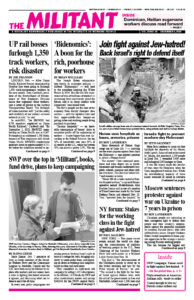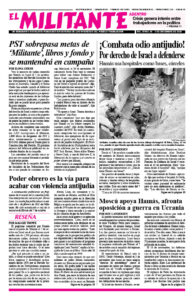LINCOLN, Neb. — After Union Pacific Railroad bosses announced in October they were going to furlough 1,350 track-maintenance workers in the next month, Tony Cardwell, president of the Brotherhood of Maintenance of Way Employes Division union that organizes these workers, sent a letter of protest to the Surface Transportation Board. The furlough of union members will “put the safety and reliability of our nation’s railroad network at risk,” he said.
In mid-2015, “the BMWED had 8,791 members employed on Union Pacific Railroad,” Cardwell said. “By September 1, 2023, BMWED membership on Union Pacific was at 6,087. Furloughing an additional 1,350 Maintenance of Way employees will shrink Union Pacific BMWED employment numbers down to approximately 4,737, far below the minimum needed to operate a safe and reliable railroad. It has done this with little regard for reliability, safety, or longevity.”
“I don’t look at our front-line employees as unionized,” Union Pacific CEO Jim Vena had told Railway Age a week earlier, displaying his disdain for them. “They understand how important it is to work in a safe manner. If we do that, we change the culture, we end up with a better employee. I want everyone in the company to be shareholders.”
“Union Pacific intends to defer much-needed maintenance on its right of ways, tracks, buildings, and bridges for the sole purpose of showing a larger profit to its shareholders in the fourth quarter,” Cardwell wrote the board. “As you are well aware, deferred maintenance will only lead to catastrophic outcomes.”
Jakob Forsgren, a track welder and chair of Brotherhood of Maintenance of Way’s Lincoln, Nebraska, local Lodge 1320, told the Militant, “After reading Vena’s Railway Age propaganda piece, what stood out, he wants everybody in the company to be ‘shareholders.’ The railroad bosses want everyone to think in terms of ‘what will benefit the stock price?’ and as a result accept terrible pay, benefits and working conditions.”
Threat of more East Palestines
Railway Age did challenge Vena on safety, saying, “This year there have been a few high-profile accidents.” The pro-boss publication was referring to the disastrous derailment in East Palestine, Ohio. On Feb. 3, 50 cars of a Norfolk Southern train went on the ground there, including five tank cars containing toxic vinyl chloride.
Norfolk Southern bosses and government officials decided to drain and set on fire the toxic chemical, sending a giant plume of smoke into the air and contaminating the land, waters and air throughout the region. Residents were evacuated, fish in area creeks died by the tens of thousands and people began complaining of medical problems.
The railroad bosses’ goal was to get trains running again as fast as possible, immediately rebuilding the tracks on top of contaminated ballast and soil. They only reversed course after a mass outcry from area residents.
In hearings conducted by the National Transportation Safety Board, rail workers and their unions have shown that the bosses’ greed caused the derailment. In their drive for profits over the last decade, Norfolk Southern and the other four U.S. Class 1 railroads have slashed their workforces, and now run fewer, longer, heavier trains, raking in cash by tossing safety concerns aside.
Derailments continue to plague the understaffed railroads, threatening crews and area residents alike. The Federal Railroad Administration says it records at least two derailments every single day.
“When I was working as a track inspector on the BNSF railroad,” Paul Swanson, a retired track inspector and Brotherhood of Maintenance of Way member in Colorado, told the Militant, “visual track inspection could not find internal defects in the rail. Those can only be found with detector trucks that use electronic signals to detect internal defects. They operated every four to six weeks on subdivisions with heavy tonnage.
“Those detector trucks usually found 10 to 20 defects every 100 miles.”
“There is no such thing as ‘we’ on the railroad. There is the union workers and the bosses,” Swanson added, countering Vena’s claims they’re all one happy family. “Technology such as using electronic signals to find internal rail defects are important to make railroading safer, but more important is having more frequent worker inspections to find the defects and more workers to repair the tracks.”
The railroad unions need to use union power to fight for workers control over maintenance and operating conditions, so safety is first and foremost over profit. This is the only way to reverse the treacherous conditions rail workers and those that live and work near railroad property face.

